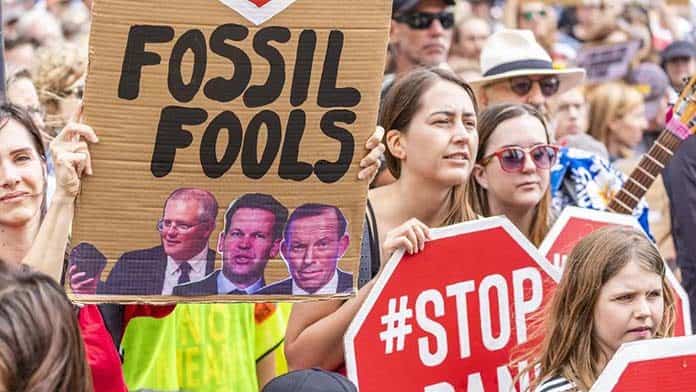Since their re-election, the Coalition has made it clear there will be no change to their useless climate policies. As it stands, the government is unlikely to even reach their own pathetic emissions reduction target set out in the Paris Agreement.
The government’s main climate policy is the Emissions Reduction Fund, recently re-named the Climate Solutions Fund, which pays large polluters to reduce their emissions and funds offset projects like re-vegetation.
This has proven to be incredibly ineffective. Since 2017 emissions reductions through the program have almost stopped, due to the cancelation of contracts for unfeasible projects and an increase in the cost of suitable projects. Although the scheme has spent $2.55 billion of a planned $4.55 billion, Australia’s emissions continue to rise.
In addition, the government will financially support a number of other energy projects, whether through a floor price, loans, small grants or other mechanisms under the Underwriting New Generation Investment (UNGI) scheme. This was proposed in response to the Australian Competition and Consumer Commission (ACCC) Inquiry into Australia’s energy network. Its conclusion was that price increases and the danger of an energy shortfall were caused by a lack of competition in the energy market.
Shortlist
In March the Morrison Government released a shortlist of 12 energy projects it is proposing to support to boost competition and encourage new investment. Five of these projects are gas power stations and one involves the expansion of the coal power station at Lake Macquarie in NSW. Resources Minister Matt Canavan has confirmed the government plans to, “progress investments in coal-fired power” and conduct a feasibility study for a coal-fired power station in North Queensland.
This ignores both the climate science that demands we reduce emissions created by burning coal and gas, and the evidence that the problems that have arisen are due to energy privatisation. In effect, the scheme places a band-aid over a large wound without removing the infection.
The ACCC’s Retail Electricity Pricing Inquiry outlines many of the problems with the Australian energy sector. Privatisation since the 1990s has made energy unaffordable and disproportionately burdened low-income earners. The lack of restrictions on monopoly ownership has allowed a few companies to control energy production and sales, enabling them to dictate prices.
The report outlines two significant failings in renewable energy policy. Firstly, the solar feed-in tariff schemes implemented by various states have meant those who can afford solar panels have benefited from an average $538 per year savings in electricity.
Households that cannot afford solar are forced to pick up the bill for reduced revenue from the grid. Secondly, the lack of an “enduring and stable climate change policy” has created problems around energy investment. On the one hand it has enabled the owners of Northern and Hazelwood to suddenly close down coal-fired power stations, leaving a hole in energy production capacity and over 1000 people without jobs. On the other, it has created investment uncertainty and discouraged investment in renewables.
Even without any government action the market is projected to reach 48 per cent renewable energy by 2030. But if left unregulated, this could mean an increase in energy shortages and further price increases.
However, it will take far greater measures to even begin to stabilise the climate. To stand a fighting chance against the climate crisis would require reaching net zero emissions by 2050 globally.
Investment in coal and gas power stations must end. The government needs to establish a clear climate policy that supports the development of renewable energy through direct funding and public ownership, as well as new jobs and training programs to transition those employed in fossil fuels. No market mechanism will work because the privatisation of our energy system is part of the problem.
The Spreading the Climate Strike organising group at Sydney University has called a rally outside Liberal Party Headquarters on 7 July to protest the underwriting of investments in coal and gas, and calling on the government to instead invest in renewable energy and climate jobs.
But the key focus for the movement is the next Climate Strike called by the School Strike for Climate organisers as part of a global day of action on 20 September. This time unions and workers need to strike with them too. The UTS NTEU Branch Committee has already passed a motion saying it will, “work to ensure the widest possible stoppage of work and study to attend demonstrations on this day.” Last time the university allowed staff to leave work and reschedule classes, and the hope is to repeat this. Discussions are also underway with the aim of organising contingents from as many other unions as possible.
As the Liberals continue to ignore the need for climate action, we need to step up the fight.
By Thandi Bethune






